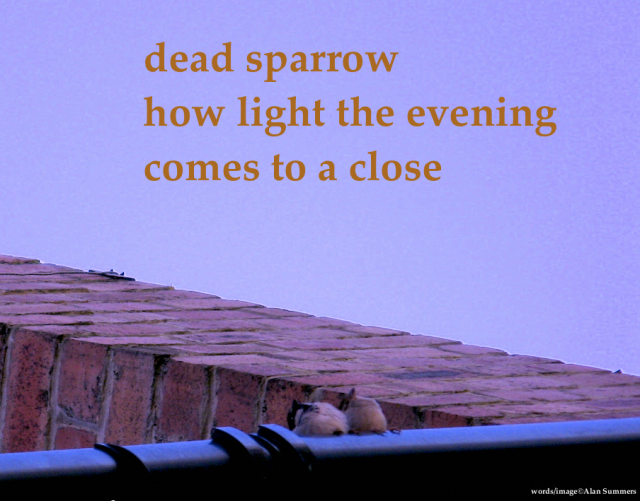
The first line shocks us into the present moment. Sparrows are beloved birds, not only because of their miniature size, but also because of their sweet songs and ubiquitousness. Sparrows as a kigo, or seasonal reference, qualifies for each season, and this adds to their universality perceived in the haiku.
The last two lines depend much on how one reads “light.” Is it light in color, light in weight, or physical light? Summers does not say, but from the feeling we get from reading to the end of the haiku, we might say it is a mixture of both compassion and irony.
The compassion comes from nature giving a spontaneous signal of care or love through a light sky in the evening. This period of the day is lovely and gives off a sense of peace.
The irony could be in the fact that with such a fateful day of a death, the dusk comes lightly (maybe an extended twilight) instead of a definite darkness that would go along with the mood of the day.
This haiku reminds us that nature can be unforgiving and be compassionate simultaneously—and most likely, this is all a matter of spontaneity.
Through the use of sound, Summers makes an even stronger impression on the reader. The use of “l” in “light” and “close” brings about the seriousness of the subject matter, in my opinion. With the alliteration of “comes” and “close” I believe the finality of the event is felt more.
The haiku seems effortlessly written, but the phrasing also appears to have been chosen with intention.
The way I interpreted the photo was that this is the view of the dead sparrow, if it could see. But maybe it is still seeing….
– Nicholas Klacsanzky (Ukraine)

Reblogged this on Frank J. Tassone and commented:
#Haiku Happenings #9: Nicholas Klacsanzky reviews Alan Summers’ “Sparrow…”!
LikeLiked by 2 people
Many thanks!
warm regards,
Alan
LikeLiked by 1 person
My pleasure, Alan!
LikeLiked by 1 person
A masterly haiku, Alan. We feel for the sparrow yet glory in our oneness with nature.
Warm regards,
Paul
LikeLiked by 2 people
Pingback: Alan Summers’ Sparrow | Haikutec's Weblog
Pingback: Alan Summers’ Sparrow – Haiku Commentary | word pond
Dear Paul,
I can’t believe I didn’t see this comment before! That’s a great quote! And deeply appreciated!
warm regards,
Alan
LikeLiked by 1 person